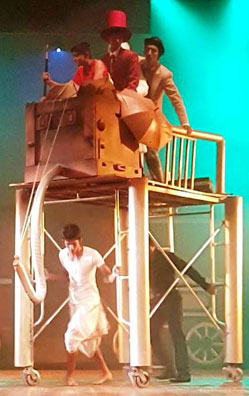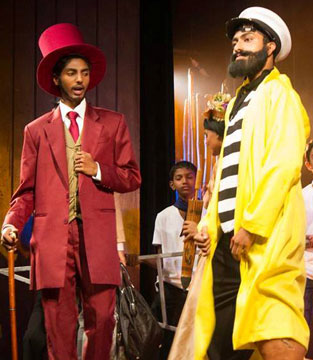|
 Review of the play Around the World in Eighty Days : Review of the play Around the World in Eighty Days :
Budding talent to enrich English theatre
by Dilshan Boange
 Around the World in Eighty Days, the theatrical adaptation of the
classic Jules Verne novel directed by well known theatre practitioner
Thushara Hettihamu and presented by the Royal College English Drama
Society in association with the Old Royalists Association of Dramatists,
had its opening night on August 12, at the Wendt, where it received a
thunderous applause, at curtain call. That evening, under the gentle
darkness, occupying seat Q-7, yours truly witnessed what was truly a
commendable work of theatre, considering the talents on stage consisted
of schoolboys. Around the World in Eighty Days, the theatrical adaptation of the
classic Jules Verne novel directed by well known theatre practitioner
Thushara Hettihamu and presented by the Royal College English Drama
Society in association with the Old Royalists Association of Dramatists,
had its opening night on August 12, at the Wendt, where it received a
thunderous applause, at curtain call. That evening, under the gentle
darkness, occupying seat Q-7, yours truly witnessed what was truly a
commendable work of theatre, considering the talents on stage consisted
of schoolboys.
Hettihamu’s production was based on the script by award winning U.S
playwright and screenwriter Laura Eason, who has to date authored twenty
full-length plays, including originals and adaptations. Eason’s Around
the World in Eighty Days had first been staged in 2008.
Hettihamu’s creative direction of Around the World in Eighty Days
relied much on the effects of lights and audio with effective minimalist
arrangements of props that projected a colourful and active fabric of
performance. The craft devised, which was not of a ‘realist modality’ in
terms of set design and narrative method, evoked glimpses of Dracula,
produced by Ananda drama last year, of which Hettihamu was a
co-director. This director’s ability to unfold a spectacular visual
experience is more or less now a proven fact.
Vision
The vein for an innovative vision for stage was displayed,
especially, in the manner in which the elephant ride through the jungles
of India was presented.
 The elephant, devised as a moving platform on shafts with wheels and
fixed with appendages to resemble a pachyderm, was praiseworthy. I
wondered if it might be made part of the curtain call! The play was
certainly a ‘manpower heavy production’. The elephant, devised as a moving platform on shafts with wheels and
fixed with appendages to resemble a pachyderm, was praiseworthy. I
wondered if it might be made part of the curtain call! The play was
certainly a ‘manpower heavy production’.
The theatrical narrative of travel showed theatre craft that relied
on props, at times held in place by a score of extras, for example as
the ship deck railings, to symbolize the passage across the Atlantic.
Royal College, to the best of my knowledge, boasts the largest student
body in any school the world over. Hettihamu thus knew how best to
utilize the strengths at his disposal since theatre in Sri Lanka cannot
as yet hope to see massive scale expenditure to present Broadway stage
techniques and technology, in such stories.
Inaudible
I cannot sincerely say the acting was superlative if discerned in the
context of the larger English theatre scene in Colombo, but it must be
borne in mind in all fairness, that the actors were schoolboys. There
was, to a considerable extent, ‘symmetry in acting talent’ in the
‘fabric of the performance’. While of course it was a production with a
heavy cast of extras, in addition to having certainly more than a couple
of principal characters with notable ‘stage time.’ In general, I
believe, there were no players whose performance was projectile to the
extent of dwarfing another’s performance into the shadows while acting
side by side.
However, it must be noted that a character who was ‘theatrically
colourful’ and somewhat notably compelling was one legged Captain Andrew
Speedy, played by Suneragiri Liyanage. The bursts of liveliness that
exuded from that persona are certainly to the young actor’s credit.
The play’s opening which showed the rigidly undeviating routine of
the protagonist, Phileas Fogg had the audio factor playing to a degree
it overpowered the first couple of lines of dialogue. The beggar woman’s
line “Alms for the poor?” was not intelligibly audible at first
utterance, from where I sat. Another noticeable factor with dialogue
projection was how the street sweeper and flower seller touched on a
cockney accent that was not maintained consistently.
Cockney is not the easiest of ‘English vernacular’ to reproduce in
the Sri Lankan tongue. Neither, is it the most graspable ‘English’ to
our ear. While the character of Fogg’s valet Passerpartout was performed
convincingly, portraying a Frenchman manoeuvring his tongue to be
Anglophone, the Indian accents too were well delivered, I would say.
 It must be noted, English pronunciation as one related to class in
British India, just as in England, was nuanced in the play through the
character of the widowed princess, Kamana Aouda, who spoke clear
Standard English indicative of how the upper crust of colonies spoke
English similar to England’s high society. Rivi Wijesekera delivered a
commendable performance as Mrs. Aouda, though his voice projection
slightly emanated the masculinity that belied the saris and dresses. The
ideological currents in Verne’s novel is partly about how man’s will can
prevail over nature through his knowledge in the sciences and
technology, and overcome obstacles that place natural limitations on
man’s desire for conquest of time and space. Around the World in Eighty
Days contains certain colonial outlooks. Verne was after all a product
of his times. It must be noted, English pronunciation as one related to class in
British India, just as in England, was nuanced in the play through the
character of the widowed princess, Kamana Aouda, who spoke clear
Standard English indicative of how the upper crust of colonies spoke
English similar to England’s high society. Rivi Wijesekera delivered a
commendable performance as Mrs. Aouda, though his voice projection
slightly emanated the masculinity that belied the saris and dresses. The
ideological currents in Verne’s novel is partly about how man’s will can
prevail over nature through his knowledge in the sciences and
technology, and overcome obstacles that place natural limitations on
man’s desire for conquest of time and space. Around the World in Eighty
Days contains certain colonial outlooks. Verne was after all a product
of his times.
However, I couldn’t help but note how the turbaned Indian who rang
the bell in the train station was made a comic figure, portraying a
‘numbskull’ to be laughed at. Also, the cortege bearing the funeral
party which was to commit the widow Aouda to a ‘sati pooja’, proceeded
with a gait characterized by a regular ‘group hiccup’ which elicited
sparks of laughter from various quarters in the auditorium, that
evening.
I personally thought it was lamentable when many burst out laughing
when the scene of Bombay unfolded, where vadai sellers came on stage
calling out vadai, vadai as a vibrant set of Indians in turbans and
dhotis brought to life an impression of the East. As easterners
ourselves, whom are we laughing at, and through whose eyes? ‘Colonial
reflexes’ in times said to be ‘postcolonial’? I wail in silence when I
note such responses.
Theatre as an art and a medium is a social engagement of many facets.
Laughter, as a human emotion is not without its politics, as discussed
with philosophical insights in works such as, Milan Kundera’s The Book
of Laughter and Forgetting.
Headwear
What should also be noted about the narrative approach presented by
the play, is that towards the end one sees a small sliver of
‘meta-theatre’ as the policeman is instructed by Inspector Fix to switch
police headwear from a Punjabi police turban to an English ‘bobby’ hat.
The switch of headwear in plain sight, on instruction by a character,
complemented by a change of accent to establish a switch of character,
implies one of the principle markers of ‘meta-theatre’ which is the
admission by the characters themselves that they are in a performance
for an audience.
What was offered to theatregoers in Around the World in Eighty Days,
shows, there is much budding talent to enrich the English theatre in Sri
Lanka. It showed degrees of creativity that speak of more exciting
things to come in the days ahead.
I offer my sincere applause to Hettihamu, the young thespian talent
that came to life on the boards and all who had a hand in bringing to
life a Sri Lankan production of Around the World in Eighty Days. |

